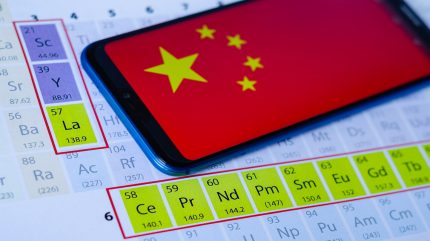
China has imposed new export controls on seven additional rare earth elements (REEs) including yttrium, dysprosium and terbium, which are crucial to modern technology such as jet engines and electric vehicles, reported Reuters.
The move follows US President Donald Trump’s increase in tariffs on Chinese goods.
China’s inclusion of these elements on its dual-use export control list raises concerns over global supply chains.
The dual-use export control list does not guarantee outright export bans but allows for increased scrutiny of buyers, especially those linked to US military supply chains.
This has already led to a halt in Chinese exports of germanium and gallium to the US before a complete ban in December 2024.
The US Geological Survey estimates that global production of yttrium, one of the rare earths now under export restrictions, is no more than 20,000 tonnes (t) annually.
Despite their small quantities, these metals are ubiquitous in modern technology, highlighting the potential impact of China’s export controls.
China’s control over the rare earth market remains unchallenged, with the country accounting for around 60% of global mined production. It also dominates the processing stage, handling roughly 90% of global output.
Western countries are attempting to reduce dependence on Chinese rare earths by developing new mines and recycling projects. However, these initiatives are not yet close to competing with China’s production capabilities.
The new export controls are expected to cause immediate supply disruptions and could signal a decrease in Chinese rare earth supplies to Western military buyers.
While China has other critical metals it could leverage, the rare earth export ban seems to be a strategic option reserved for future use as trade tensions with the US continue to rise.
In February 2025, China imposed export restrictions on five key metals including tungsten and indium, which are critical to industries such as clean energy and defence.
Earlier this month, China also unveiled a set of countermeasures in response to US-imposed tariffs, intensifying the trade conflict between the two largest global economies.



